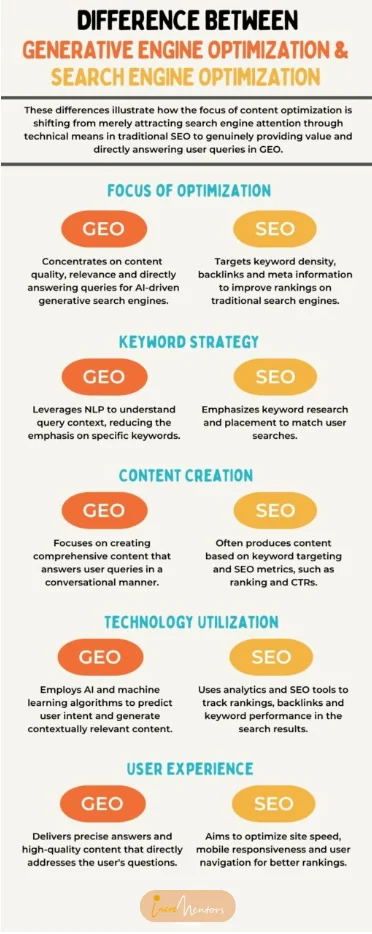What is Generative Engine Optimization?
GEO stands for generative engine optimization, a moderately new technique that can be used for the optimization of websites. It utilizes higher techniques of computations and analyzed intelligence to create content that is capable of naturally inviting traffic. Generative engine optimization is a process that assists websites to achieve greater importance, relevance, and exposure to target attendees, by employing the efficiency of AI and relevant data findings.
Another extremely important attribute of generative engine optimization is flexibility and the ability to generate content based on given intent and search queries. This means that people who run the website can develop a tailored and relevant page for each visitor, thus, being able to catch his attention and possibly convert him. It is unlike most SEO methods that require manual accomplishment and use of keyword search to identify proper phrases to incorporate in the content that will be used, generative engine optimization is fully automatic and the content that is being generated is fresh and fully optimized.
Here is another important factor of generative engine optimization, mainly due to its capability of continuous evolution as a system. Since the dynamics of search engine practices and user tendencies are dynamic, generative engine optimization algorithms can adapt well to dynamic environments for the best result. That is why, it is one of the most effective and long-term efficient solutions for increasing website visibility and organic traffic.
Overall, generative engine optimization is a brand-new innovative method of applying artificial intelligence and machine learning methods to improve the work of websites and increase traffic organically. It makes it possible for websites to generate content that is relevant to user intent or even specific keywords that users use on the search engine, and this increases the probability of the site being best optimized for the search engines and also increases the chance of the site providing the best experience to the users.
The Basics of Generative Engine Optimization
Before getting deeper into generative engine optimization, there is a need to give an insight into the basic concept. In other words, generative engine optimization is a technique that involves the use of complicated mathematical calculations carried out by a computer and machine learning selection to come up with content.
It involves writing this content with a clear purpose of targeting what the intention of the user is and the keywords they are likely to use when seeking information over the internet so that the particular web page appears on the first pages of the search engine results pages (SERPs) with a view of appealing to a specific targeted organic traffic.
Generative engine optimization involves a three-step process: gathering data, data interpretation, and writing content for the websites. During data collection, the data algorithm captures data on the usage of applications, search terms, and website performance. These are processed to detect various patterns apparent in targeted content for which one seeks to optimize.
This type of system explains that after all the data analysis is done, the generative engine optimization algorithm utilizes the creation of content after getting some insight from the data. This content is therefore SEO friendly and it has a focus that is well aligned with the user’s intent. It is aimed at bringing useful and topical content to the site’s users to boost their interest level and the possibility of completing transactions.
The last crucial stage in generative engine optimization is the monitoring and optimization of results. It is essential to phrase it so that the algorithm looks at the website permanently and constantly searches for problems and inefficiencies. Then, it modifies the content creation stream to keep on optimizing this website to fit into the competitiveness of the ever-evolving website industry.
It is, accurate to summarize that generative engine optimization is the application of stochastic algorithms and machine learning to generate content that is friendly to the search engines on its own. Generative engine optimization is the accumulation of data, the creation of data-generated content, and consistent analysis of performance and site ranking to enable websites to have better SERP visibility and gain organic traffic.
The Benefits of Implementing Generative Engine Optimization
The introduction of generative engine optimization has some advantages for both website owners and businesses who use methods to increase their online visibility and organic traffic. Some of the key benefits include:
1 Improved search engine rankings: Generative engine optimization plays a crucial role in enhancing website position, thus making them more visible to potential users and clients on search engine results pages (SERP).
2 Personalized content: Generative engine optimization focuses on providing unique content to the visitors based on their intent of the search and interests; so, the visitor engagement is enhanced, and its probability of concluding a sale is achieved.
3 Time and cost savings: GEO means the process of content creation is going to be done automatically, which enables individuals to save a lot of time and effort that will have to be invested in the optimization of keywords and researching the same.
4 Continuous optimization: Search engine optimization algorithms always keep a watchful eye on the web page ranking and performance, so, the material is always updated and ranks high in the continuously growing competition.
5 Future-proof strategy: Since GEO algorithms allow the utilization of data analysis of the engines and the users, it can be seen as a better approach that will perform well in the future as the algorithms change. The behavior of the users also changes.
Therefore, investing in GEO can result in better search engine rank, offering customized content to its audience, a reduction in time and money spent, constant, and an evolution of the generative engine optimization approach that secures website prominence and traffic.
How Generative Engine Optimization Differs from Traditional SEO
The difference between generative engine optimization and traditional SEO is that the former purpose at increase the visibility of the site on the web and bring in traffic naturally through a different approach.
While traditional SEO is a technical process of making changes to a website in the hopes of enhancing its position in the SERPs, it has some basic approaches like keyword optimization. It comprises keyword selection, meta tag, description placement, link building with valuable backlinks, and effective web organization and layout. Website optimization performed by the best SEO companies is a continuous process and the results usually have to be monitored over time to sustain the expected rankings.

On the other hand, generative engine optimization – is an approach that utilizes sophisticated algorithms and machine learning to generate content on its own, tailored to fit the search engine algorithms. The information on the site is constantly associated with the specific search request, providing a unique experience for any user who comes across the website.
GEO also refers to an automatic content creation and website optimization process that is conducted mechanically in a fraction of a second depending on the user activities and search engine criteria.
Other differences include the importance of the ranking to which the two can be taken and how flexible each is. Organic SEO practices may demand a lot of time and energy as compared to the H1 tags, headlines, and subheadings that need to be formatted for various keywords and phrase matches. While GEO can create content at scale and is more flexible regarding shifts in user preferences and popular search engine algorithms. Thus, SEO makes it a more strategic and sustainable approach to enhancing Website visibility and acquiring more organic traffic.
In conclusion, generative engine optimization is not like the usual SEO because it involves the use of generative engines to generate better content using some algorithms and machine learning. It means that SEO is more scalable, more adaptable, and much more automated as compared to the other traditional approaches to increasing the visibility of a website and increasing organic traffic.
Key Strategies for Successful Generative Engine Optimization
To make generative engine optimization functional and to maintain its effectiveness and reach as best it can, it is necessary to attach to strategic guidelines. The previous strategies can be used for the enhanced effective generation of content, increased rank for organic search results, and increased organic traffic to the website. Some of the key strategies for successful generative engine optimization include:
1 Data-driven insights: Search for relevant information that will enable one to get information on the use of the site, search engine terms, and other factors. These insights can be used to enhance the content and increase the viewability of the website.
2 User intent optimization: Executive summarization for content consumers means concentrating the client’s emphasis on recognizing user intent to deliver content to them that matches their particular interests. By offering relevant information, your prospects will be more responsive and there are more opportunities for getting good results.
3 Continuous monitoring and optimization: Aggregate data continuously on the performance of websites, and users and hunt for new trends and search engines. Strategically and repeatedly refresh the content of the website in a proposal to update and keep content relevant, unique, and search-engineering optimized.
4 Quality and relevance: Create content that is useful and provides satisfaction to customers as they engage their time on your website. Ensure that visitor’s question is answered with insightful content that aids them and gives a solution to their problems.
5 Mobile optimization: With the rise of the mobile audience, it is critical to target the mobile consumer and make content more accessible to them on mobile devices. Make sure that your website is friendly and ranked on mobile devices and that the user experience is comparable irrespective of the device used.
6 Stay updated: This involves ensuring that you update yourself on all the current trends and advancements of generative engine optimization, as well as the search engine algorithms in use. Creating routine habits such as reading articles and following industry updates to identify new trends, subscribing to relevant webinars and conferences, and reaching out to other practitioners to gain newer insights.
By implementing the following key strategies, you are able to enhance and advance your generative engine all the while boosting the relevancy of your site to generate search engine and direct organic traffic, and thus, it uses the full advantages of generative engine optimization.
Conclusion
Generative engine optimization is a powerful method that incorporates artificial intelligence and machine learning to optimize websites and elevate organic visitors. Through writing content in a way that aligns perfectly with the expectations and keyword inputs of the users, generative SEO ensures that websites enjoy high ranking within SERPs and pull in qualified organic traffic.
Leveraging generative engine optimization has some advantages such as SEO improvement, user-unique content generation, time and cost-effectiveness, and perpetual optimization, if not permanent, for more website traffic and visibility.
There are some strategies that website owners need to utilize to successfully implement generative engine optimization: data collection and analysis, developing the content based on the user’s intent, constant and persistent monitoring, creation of high-quality and relevant content, designing for mobile users, and updating themselves on the latest trends.
Another part of these strategies is the usage of proper tools and resources, which include generative engine optimization platforms, keyword research tools, analytics tools, SEO plugins, blogs, and forums from the industry, which will help the generative engine and ensure that it runs at the best capacity.
FAQ
1 What is generative engine optimization?
Generative engine optimization is a relatively new approach aimed at bringing out the best of websites and making them more noticeable on the Internet. Generally, it is the application of sophisticated techniques and algorithms, artificial intelligence in particular, to produce content to be posted online, which is likely to receive and generate organic traffic.
2 How does generative engine optimization work?
Automated writing is a method of creating optimized content through AI-generated keywords, and is also known as generative engine optimization. Due to that, it is adaptable to the user’s intent and search queries, meaning that it offers unique and suitable content to every visitor.
3 What are the benefits of implementing generative engine optimization?
Some of the key benefits of implementing generative engine optimization include improved search engine Therefore, the advantages of practicing generative engine optimization are; high ranking search engine results, and customizable content, this practice comes with time and cost efficiency, it is an ongoing process, and finally, it is a long-term strategy for the visibility of your website and growth of traffic.
4 How does generative engine optimization differ from traditional SEO?
While generative engine optimization is designed to work alongside traditional SEO in the same manner as it alters and creates content to improve the general view of a website and the resulting traffic, it employs the use of generative engine learning algorithms to do so.
5 What tools and resources can help optimize a generative engine?
Some recommended tools and resources for optimizing a generative engine include generative engine optimization platforms, keyword research tools, analytics tools, SEO plugins, and industry blogs and forums.
6 How can generative engine optimization benefit my website?
Generative engine optimization can benefit your website by improving search engine rankings, providing personalized content, saving time and resources, continuously optimizing performance, and offering a future-proof strategy for website visibility and traffic growth.

